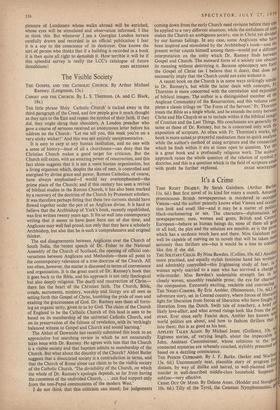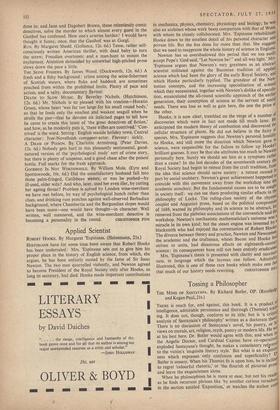It's a Crime
TIME RIGHT DEADLY. By Sarah Gainham. (Arthur Barker, 1 Is. 6d.) Best first novel of its kind for many a month. Amusing' promiscuous British newspaperman is murdered in occupied Vienna—and the author patently knows what Vienna and occi
tion look and smell like—and it may be a matter of politic
black-marketeering or sex. The characters—diplomatists all newspapermen; men, women and gents; British and Cent European—behave as human beings do, none of them all Odd or all bad; the plot and the solution are sensible, as is the prose' which has a sardonic touch here and there. Miss Gainham well be capable of moving on to novels that will be taken 111°re seriously than thrillers are—but it would be a loss to coital° like this if she did.
THE SOLITARY CHILD. By Nina Bawden. (Collins, 10s. 6d.) Anot more practised, and equally stylish feminine hand has writte and admirably controlled—this frightening study of fear, i woman newly married to a man who has survived a chargi wife-murder. Miss Bawden's undeniable strength lies in he closely woven, smoothly readable prose; the eye for character the compassion. Extremely exciting, readable and convincing' THE NIGHT-COMERS. By Eric Ambler. (Heinemann, 13s. 6d.) All
jo adventure story, set in Conrad country, where forces of libera
fight for liberation from forces of liberation who have fought fo liberation from the Dutch. Swift tale of treachery, a brief all likely love-affair, and what armed risings look like from the Ile street. Ever since early Fascist days, Ambler has known Oa' world politics are about, and how to fashion thrillers tha into them; this is as good as his best.
APPLEBY TALKS AGAIN. By Michael Innes. (Gollancz, 10s. Eighteen stories, of varying length, about the impeccable John, Assistant Commissioner, whose solutions to the t connected mysteries are urbanely couched, stylishly presented based on a dazzling omniscience. THE POISON CUPBOARD. By J. F. Burke. (Secker and Wait 13s. 6d.) Uncommonly neat, plausible story of progress fl distaste, by way of dislike and hatred, to well-planned indi murder in well-described middle-class household. Suspense subfusc—very effective. CRIME OUT OF MIND. By Delano Ames. (Hodder and Stough 10s. 6d.) Tilly of the Tyrol, the Constant Nymphomaniac, g
heti 11
S'
c5
a done in; and Jane and Dagobert Brown, those relentlessly comic detectives, solve the murder to which almost every guest in the Gasthof has confessed. How one's arteries harden! I would have thought it funny, once, that the Gasthof was at Gurgl.
RUN. By Margaret Shedd. (Gollancz, 12s. 6d.) Tense, rather self- consciously written American thriller, with dead baby to turn the screw; Freudian overtones; and a man-hunt to mount the excitement. Attention demanded by somewhat high-pitched prose slows down the pace a little.
THE SEINE FISHERS. By James Wood. (Duckworth, 12s. 6d.) A fresh and a fishy background : crime among the seine-fishermen of Scottish waters, where fluke and haddock are sometimes poached from within the prohibited limits. Plenty of pace and action, and a salty, documentary flavour.
DEATH TO SLOW Music. By Beverley Nichols. (Hutchinson, 12s. 6d.) Mr. Nichols is so pleased with his creation—Horatio Green, whose heart 'was far too large for his small round body,' so that he feeds only the smallest and weakest seagull when he strolls the pier—that he devotes six italicised pages to tell how he came to create this latest of 'the great detectives of fiction,' and how, as he modestly puts it, 'these trifles are contrived.' Con- trived' is the word. Setting: English seaside holiday town. Central character : Ivor-Novelloish composer-actor. Flavour : sickly.
A DRAM OF POISON. By Charlotte Armstrong. (Peter Davies, 12s. 6d.) Nobody gets hurt in this pleasantly sentimental, good- natured version of the 'psychological study' sort of crime story, but there is plenty of suspense, and a good chase after the poisori bottle. Full marks for the fresh approach.
GOODBYE IS NOT WORTHWHILE. By William Mole. (Eyre and Spottiswoode, 10s. 6d.) Did the unsatisfactory husband fall into those palm-fringed, Caribbean waters, or was he pushed—by ill-used, older wife? And who, later, used her even iller, by cutting her ageing throat? Problem is solved by London wine-merchant we have met before, by way of psychological hunch rather than clues, and drinking rum punches against well-observed Barbadian background, where Chambertin and the Burgundian slopes would have been more—one would have thought—in character. Well written, well mannered, and the wine-merchant detective is becoming a personality in the round. CHRISTOPHER PYM



































 Previous page
Previous page